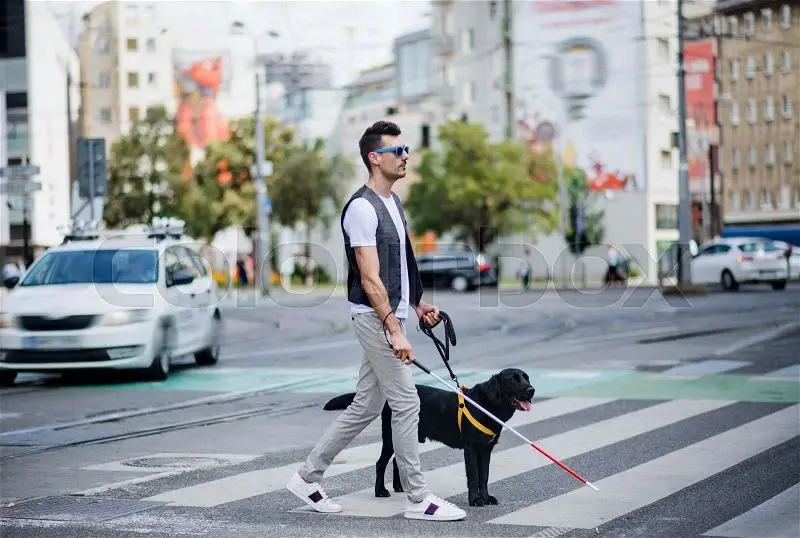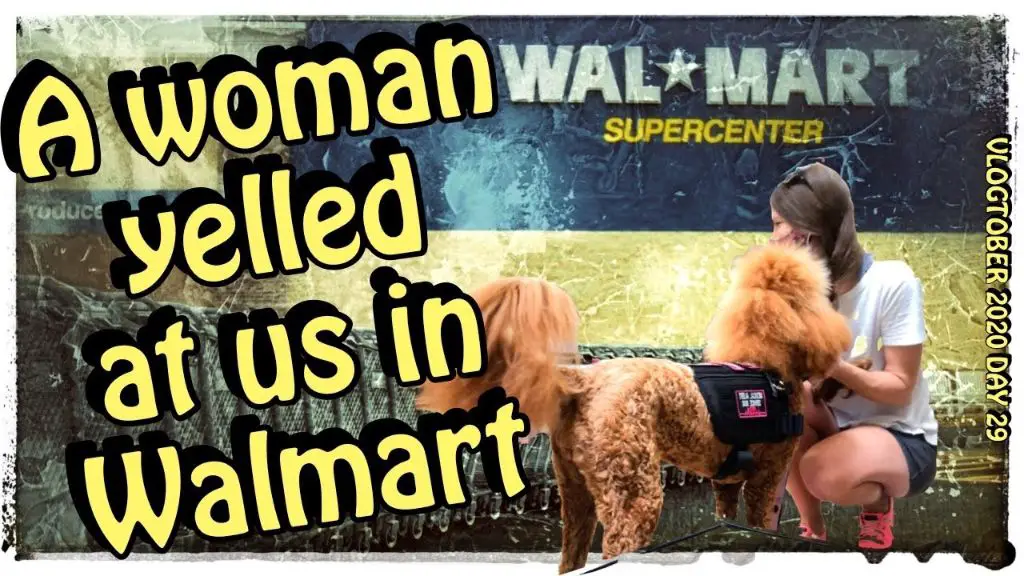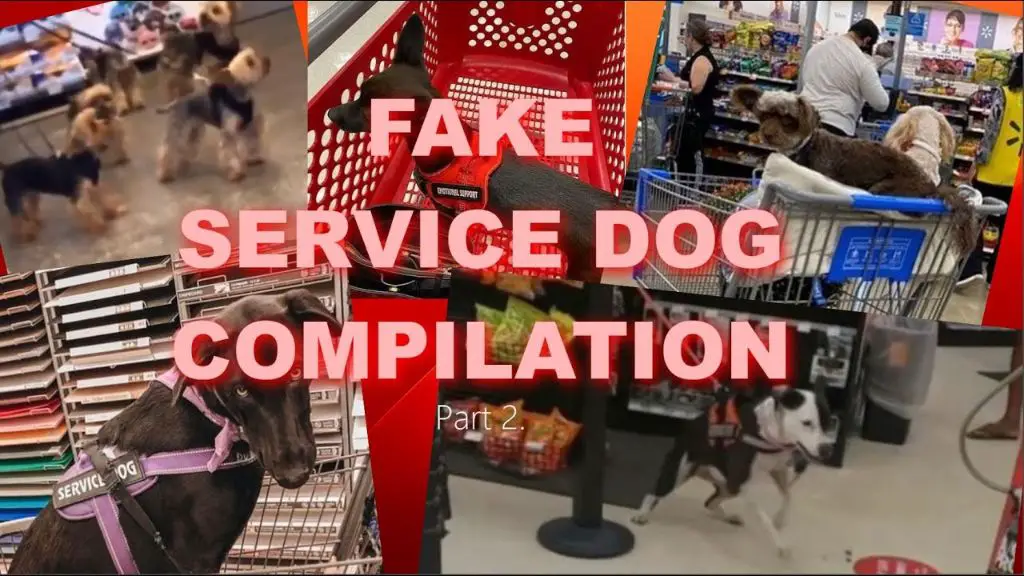Introduction
With an increasing number of people relying on service dogs to assist with disabilities, understanding the rules around service dogs has become an important issue. Service dogs provide invaluable help to their handlers, offering services like guiding the blind, alerting the deaf, pulling wheelchairs, or providing emotional support. However, there has also been a rise in people falsely passing off pets as service animals. This has led to confusion around when and how businesses like Walmart can verify whether a dog is a legitimate service animal.
The rules regarding service dog access and proof are nuanced, leading to disagreements between businesses and disabled advocates. Walmart in particular has faced scrutiny over its service dog policies. Examining the laws, Walmart’s stance, and arguments on both sides provides insight into this complex issue.
Definition of Service Dogs
Service dogs are more than just pets. They are working animals that are individually trained to perform specific tasks for people with disabilities. According to the Americans with Disabilities Act (ADA), service dogs must be trained to take a specific action when needed to assist the person with a disability. Some of the tasks service dogs can perform include:
- Guiding people who are blind or have low vision
- Alerting people who are deaf or hard of hearing
- Pulling wheelchairs
- Alerting to seizures
- Reminding people to take medication
- Calming people with anxiety or PTSD
- Retrieving items
- Providing stability and balance
Service dogs receive extensive specialized training to perform these types of tasks. They must be able to ignore distractions and changes in environments to solely focus on their handler and their responsibilities. Their training can take up to 2 years before they are ready to be placed with a person with disabilities.

ADA Rules on Service Dogs
Under the Americans with Disabilities Act, established in 1990, all businesses that serve the public must allow service dogs to accompany people with disabilities. This includes restaurants, hotels, taxis, public transit, retail stores, hospitals, and any other business that is open to the general public. The ADA also states that employees and customers with service dogs must be allowed to access all areas of the business where patrons are normally allowed to go.
Service dogs are defined as dogs that are trained to provide assistance with tasks related to a person’s disability. While service dogs are legally allowed in any space open to the public, the ADA does stipulate that the dog must be under the handler’s control at all times and meet behavioral and training standards. For example, a service dog cannot be overly disruptive or threatening while in a public space.
Businesses are not allowed to ask a service dog handler to remove a dog from the premises or refuse the dog entry unless the animal is misbehaving or causing a disruption. Doing so is considered illegal discrimination under the ADA and can result in civil penalties or a lawsuit. The only questions a business can legally ask of a service dog handler are whether the animal is a service dog required for a disability and what work or task the dog has been trained to perform.
When Businesses Can Ask for Proof
Under the ADA, businesses are only allowed to ask if a dog is a service animal required because of a disability and what work or task the dog has been trained to perform. They cannot require proof or documentation for the dog, such as an ID card or certification.
However, there are two exceptions when a business may be able to ask for more information:
- If the dog is out of control and the handler does not take effective action to control it. A business may exclude a service animal in those situations.
- If it is not obvious that the dog is a service animal. For example, if the dog is not wearing a vest or harness, the staff is not sure if it is a pet or a service dog. In those cases, they can ask about the dog’s training and what tasks it performs.
So in summary, the ADA protects people’s right to privacy and limits questioning of service dogs. But if the dog is disruptive or it is unclear if it is a service dog, staff may be able to ask for more information.
Walmart’s Stance
Walmart typically does not ask for proof that a dog is a legitimate service animal before allowing the animal into their stores. Their policy is to take the customer’s word that their dog is a trained service animal. Employees are instructed not to inquire about the specific disabilities the service animal is trained to assist with.
This approach aligns with Walmart’s desire to provide a welcoming, convenient shopping experience to all customers. By avoiding potentially uncomfortable questioning of disabled customers, Walmart aims to make service dog handlers feel accepted.

However, Walmart does reserve the right to ask a disruptive dog to leave, whether it is a service animal or not. If the dog is out of control, not housebroken, or poses a direct threat to others, Walmart can request its removal.
Why People Support Walmart’s Stance
Many people support Walmart’s policy of not asking for proof that a dog is a real service animal. Here are some of the main reasons why:
They don’t want to scrutinize disabled people. Some customers feel that asking for proof would be scrutinizing or questioning disabled people who rely on service dogs. They want to avoid making disabled customers feel uncomfortable or like they have to “prove” their disability.
They want to give disabled people the benefit of the doubt. Related to not wanting to scrutinize disabilities, some feel that the benefit of the doubt should be given to disabled customers. They don’t think businesses should assume a service dog is fake unless there is clear evidence it is not trained.
They want to avoid confrontation. Some supporters think it’s best for Walmart to avoid confrontation or conflict with customers over service dogs. They feel it’s better for staff to assume dogs are real service animals unless they are clearly misbehaving.
They think it’s rare for people to fake service dogs. Some believe that faking a service dog is uncommon enough that Walmart doesn’t need to ask for proof. They think Walmart can just address clear misbehavior from dogs on a case-by-case basis.
Why People Criticize Walmart
One of the main concerns around Walmart’s policy is that it could allow more fake service dogs into their stores. Under the ADA, businesses are only allowed to ask two questions to determine if a dog is a legitimate service animal – 1) is the dog a service animal required because of a disability? and 2) what work or task has the dog been trained to perform? Businesses are not allowed to request any documentation for the dog or ask about the nature of the owner’s disability.
Critics argue that by not verifying a service dog’s legitimacy and simply taking an owner’s word that their dog is a service animal, Walmart may enable more pet owners to falsely claim their dogs are service animals just to bring them into stores. This could lead to more poorly trained pets misbehaving, creating disruptions, and even posing dangers to shoppers with allergies or fear of dogs.
While Walmart aims to provide the most welcoming environment for disabled customers with service dogs, critics believe the policy could be abused and prefers Walmart take a stricter stance to only allow clearly identifiable service dogs into their stores, like those wearing service dog vests.
Examples of Incidents
There have been several incidents at Walmart stores involving dogs that owners claim are service animals, but which appear to be disruptive pets. For example, in 2019, a dog bit a Walmart employee at a store in Pennsylvania. The owner insisted it was a service dog, but the dog had no vest or identifying harness. Employees felt the dog seemed agitated and untrained. The incident caused injury to the worker and led to concerns about safety.
Another case occurred in 2018 when a dog attacked a customer at a Walmart in Alberta, Canada. The owner said the dog was a service animal, but witnesses said the dog was barking, pulling on its leash, and acting aggressively before biting the customer. The incident resulted in the victim requiring medical attention.
Situations like these demonstrate how some people try to bring untrained pets into stores by passing them off as service animals. Without proof, it’s difficult for businesses to determine if a dog is a real service animal or just a disruptive pet. Problems occur when aggressive or uncontrolled dogs threaten the safety of workers and customers.
How to Tell a Real Service Dog

There are some signs you can look for to help identify a real service dog versus a fake one:
-
The dog is well-behaved and does not bark, jump, or act unruly in public.
-
The dog wears a vest or harness indicating it is a service animal.
-
The dog stays close to the owner and appears to be attentive to their needs.
-
The dog performs specific tasks to assist the owner, such as guiding them, fetching items, opening doors, etc.
-
The owner clearly communicates the dog’s working function if asked politely.
-
The dog and owner appear trained to work together in public environments.
-
The dog remains calm in crowds and does not solicit attention from strangers.
-
The owner has complete control of the dog at all times.
While these signs can be helpful, it’s important not to doubt or question service dogs and their owners unless you have a legitimate reason. The vast majority of service dogs in public are real.

Conclusion
In summary, the laws regarding service dogs are complex. The ADA permits public businesses to ask service dog owners only two questions – is the dog a service animal required for a disability and what work or task has the dog been trained to perform. However, businesses cannot require proof or documentation of the dog’s training. Stores like Walmart have to balance customer safety and inclusion while adhering to the law. There have been unfortunate incidents of people bringing untrained dogs into stores, making the situation difficult for legitimate service dog users. In the end, businesses should aim to educate staff on ADA rules and create a welcoming environment for disabled customers with trained service dogs.
The key takeaways are:
- Businesses can only ask two questions to ascertain if a dog is a real service animal.
- They cannot require proof or documentation from service dog users.
- Stores walk a fine line between safety and legal compliance.
- Proper training for staff and clear policies are important.
- Legitimate service dog users deserve respect and inclusion.